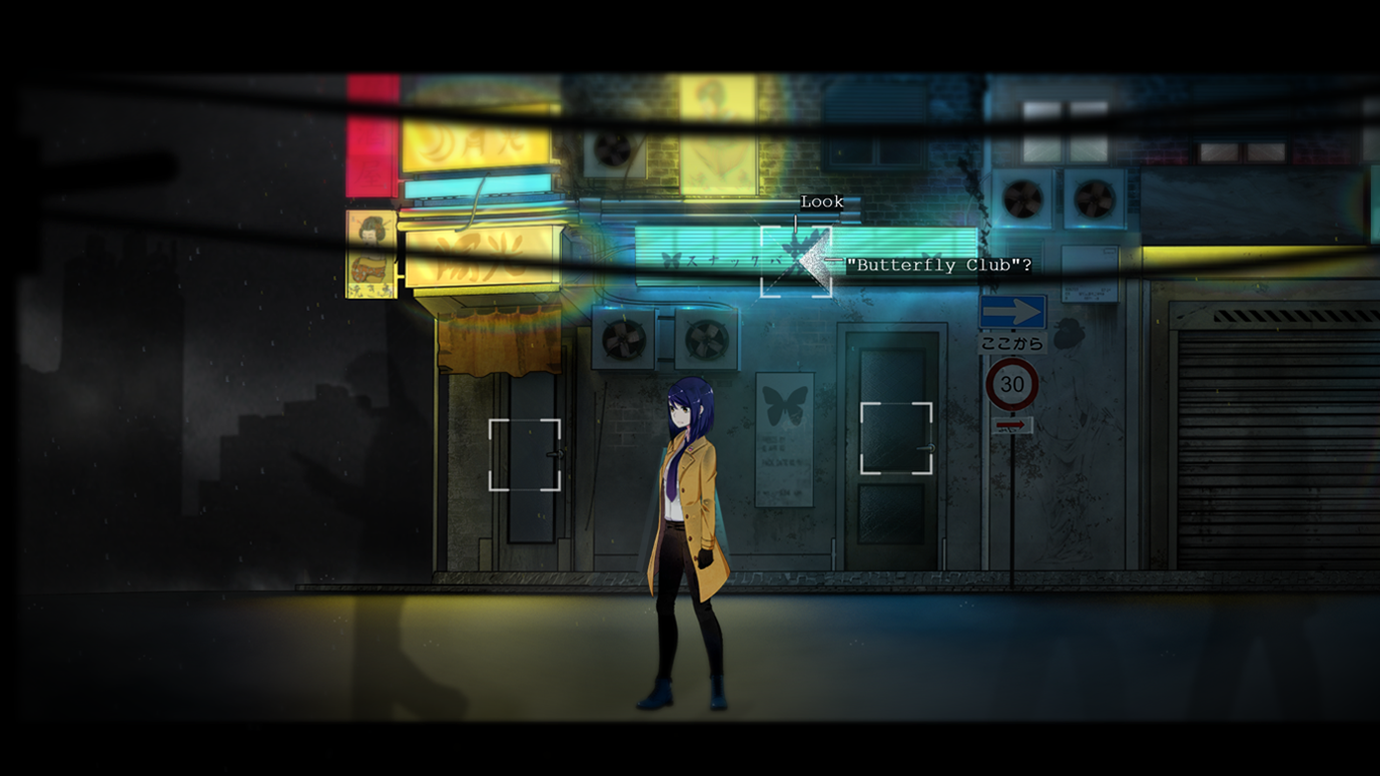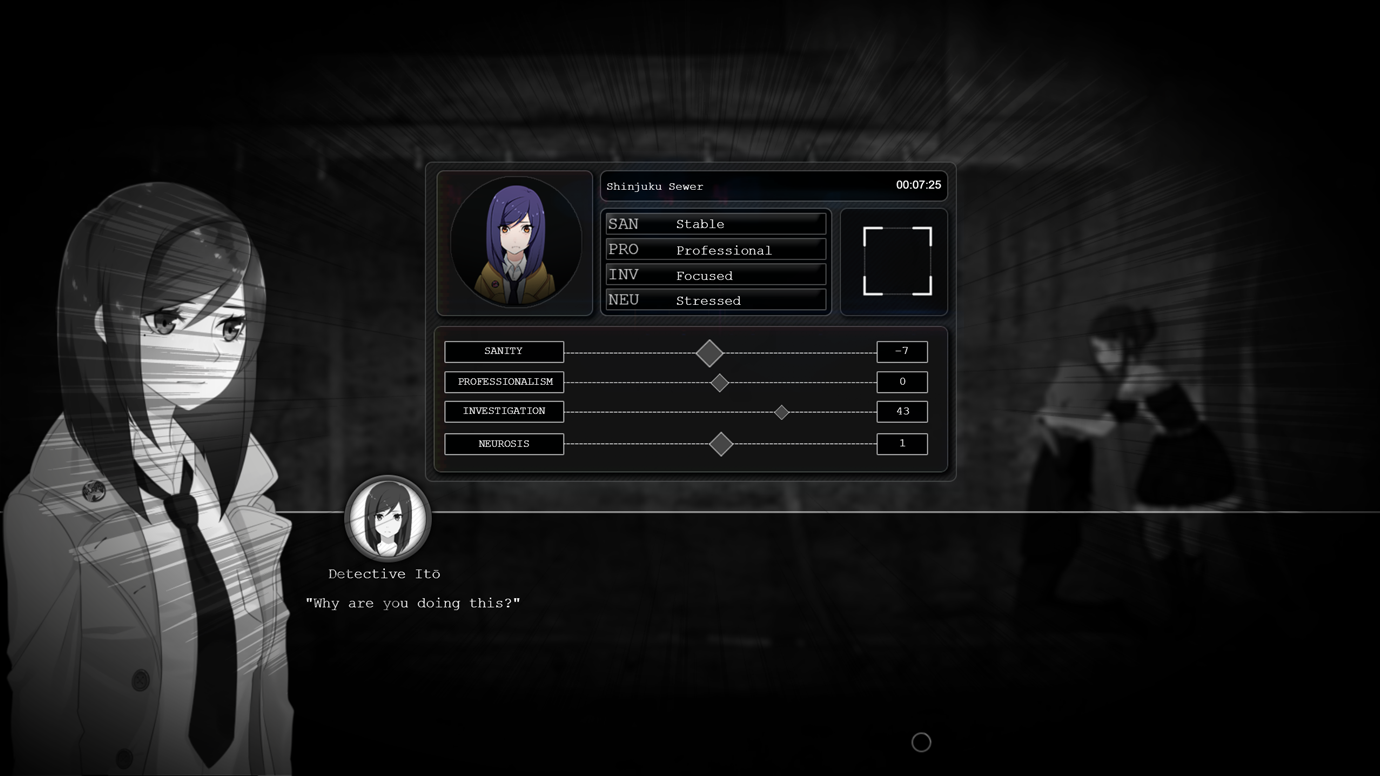
Tokyo Dark PC Review
Again we have another Kickstarter success story that until its release I had never even heard of – I should really spend more time on crowdfunding sites! Asking for the incredibly humble sum of just $32,000 (USD) allowed such a niche title like Tokyo Dark to not only be developed but improved with a number of stretch goals, that I felt were particularly necessary chunks of gameplay. In short, it’s a strange mix of a horror-themed visual novel and a point-and-click adventure, but with a larger emphasis on decision making over solving puzzles, unlike the games in the Zero Escape or Danganronpa series. In fact, I’d say there was really only one puzzle in the entire game and the rest is all down to observation and deciding how to tackle particular obstacles. And whilst every decision doesn’t greatly impact which of the 11 endings you’ll receive, they do affect the SPIN system (Sanity, Professionalism, Investigation, Neurosis) – eventually building up and altering the options available, depending on one’s playstyle. This makes for some difficult choices that piqued my curiosity right away.
Playing as Detective Ito, whose partner (both work-wise and romantically) has been missing for several days, she follows a lead after tracing his phone to one of the sketchier parts of the city. Starting off on the train, Tokyo Dark instantly – instantly – cements its theme with confusing flashes, eerie music, and the most unsettling situations imaginable. For example, one of the first decisions that took its toll on me was how I would extract information from a patron of a sleazy bar. This guy is vile but I didn’t want to start any trouble so I chose to flirt instead. + Investigation and – Professionalism on the SPIN scale but I still felt bad for doing it. Most paths are like this – a lose-lose – getting what you want but having to put Ito through some serious boot-licking or a particularly daring situation to do so. It works wonders for the sinister, uneasy feeling the game feeds off of. Especially so when when juxtaposed with the occasional burst of colour and cutesy kittens or the likes. It makes everything feel wrong.

Without wanting to spoil anything – the events that take place within the first hour of the game (flashbacks and all) send Ito into a psychotic downward spiral. From here, it’s up to the player to either help her recover, continue to push forward at risk of her mental well-being, or find some kind of balance between the real and the impossible in order to find out the supernatural truth behind lifetimes of despair. About half way through the game I found myself having to change the way I approached people as I originally went down the road of a sort of ‘tough detective that doesn’t always play by the book but gets all the information they need’, which seriously damaged my professionalism. I used violence and threats instead of perhaps a more manipulating approach. I’m not sure what exactly I missed out on because of those rash decisions I made earlier in the game but I did actively evolve my playstyle to try and counter it and thankfully avoided making a huge mistake I only discovered after watching the alternate paths later – a serious hostage situation. However, even when I consciously tried to act more professionally I found it difficult to accomplish as the options in the game are hardly black-and-white obvious morality choices like in Infamous, for example. Some of them are genuinely hard to make or are deeply philosophical, making for some interesting revelations.
The endings, sadly, are rather short and leave a lot unanswered on their own. This really made me want to see the alternatives, which is a great way to tease the player into wanting to unlock them. Unfortunately, however, the curse of the multiple endings visual novel strikes again – making it terribly irritating to experience all of the branching paths and their respective conclusions. Tokyo Dark, like most experiences of the genre, requires the player to play through the 5-6 hour game multiple times to see the other endings. It does try to alleviate this problem by having New Game+ ‘flashback’ previous playthroughs, so you can see which routes have gone unexplored and even by adding six save slots that can be used to return to big decisions points. Still, it is expected that the player run through the game again and again, re-loading at particular branches and saving before important choices in order to get all of the endings. In normal visual novels that’s a particularly big ask, even with the ability to skip straight to un-read text but in Tokyo Dark, much like exploring the different routes in Heavy Rain, actual gameplay is required, making it harder to jump ahead. After the enticing culmination I wanted to see everything, I needed to know what would have happened instead of being forced to slog through the build-up another time.

Still, even though I had to eventually look up the other endings after playing the game 1.5 times, it’s fair to say that Tokyo Dark is not just a good game but one unlike you’ve ever played. Whilst the art may make it look like a flash game (besides the occasional anime-style cutscene), it does delve into some pretty testing and philosophical topics, merging them with the paranormal. The characters are interesting and deep; even those with little screen time seem to have complex personalities that can often inform the player of their reactions to certain decisions. The audio design is simply disturbing in the most perfect way – pulling off what I believed only Silent Hill could by actually getting to me through sound alone. And every time you do something the smart way; such as when I managed to get into the Police evidence locker without anyone in the building knowing, or the forceful way; like when I used my gun just to dislodge some bamboo, you’re rewarded or punished with SPIN changes, making every tiny choice matter. All of these little pieces come together to form something completely new and intense; I hope to see a lot more like it in the future.
